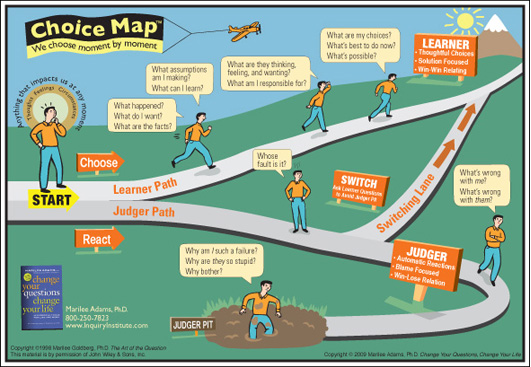What’s a judger question? What’s a learner question? Let me give this to Fast Company to explain:
Learner questions facilitate progress by expanding options, while judger questions impede progress by limiting perspectives.
The idea of judger questions and learner questions are massively important to how we communicate at work, and especially how managers and employees communicate — which has been fraught for years (centuries?). If we’re serious about the future of work looking different, we need to understand judger questions and learner questions, and we need to figure out how to move from one column to the next. Let’s dance.
Why are questions important at work anyway?
I’ve written about this a few times, namely:
- The power of asking good questions
- Let’s embrace the idea of asking questions at work
- Why questions need to be less accusatory and more empowering
Here’s a semi-deep thought for you: most of the first world, and especially most of the first world when it comes to business, is about having answers. It’s about targets and tasks and ‘strategy’ and KPIs and ROI. We want success, and we want answers. We don’t often think of failure or questions. If your boss is bellowing at you, chances are it’s about:
- Something you did wrong
- An answer he/she needs
- A number, bullet point, or target he/she needs
It’s interesting: we design work often around the idea of process — how things are supposed to happen, essentially — but we never really talk about the process, which is how you arrive at ideas or solutions. “Process” and “the process” are actually very different things.
Most work projects lack clear deliverables, honestly; many aren’t even tied to organizational priorities, sadly. This largely comes from the answers-focused, solutions-focused work culture I described above. In such a culture, questions can be seen as a sign of weakness. This is often how it goes down:
- Some manager comes and throws a new project at you
- They spit out a bunch of people’s names who’ve been working on things
- They kind of tell you a goal that might be tied to this
- They end with “Got it?”
- Because you want to be seen as competent and a “go-to team player,” you nod and say “Yep”
- You assume you’ll figure it all out later
Oftentimes, you do figure it out — but it’s not necessarily in line with what that manager, or some other manager, wanted. Here comes the screeching!
What are judger questions, then?
When the screeching and bellowing begins, it’s mostly around judger questions — most managers, sadly, confuse ‘accountability’ with ‘scaring or painting someone into a corner.’
Here are the staples of judger questions:
- Closed-minded
- Certain/absolute
- Critical
An example would be: “Why did this happen in this way?” (said defensively, not constructively) or “Who is to blame?”
Now look, there’s an important caveat here: every work culture needs to be critical to some extent. If every project you kicked up the chain came back with roses and chocolate and a note that said how great you were, you’d start to wonder who was minding the store. Half the point of having ‘executives’ at any corporation is so that people can needlessly criticize the wording of Facebook posts, then go tell their spouse, “I straight killed it today as a leader.” I jest, but not by much. When we rise up in formal power, we want the ability to criticize, review, and tweak.
That’s all good, and by no means I am arguing that every project in draft form should be viewed as perfect. What I’m talking about here is how to use better types of questions to drive work and purpose forward.
What are learner questions, then?
You’ll see these less in a given workplace. Typically, they are:
- Open-minded
- Curious
- Creative
Here’s an example: “What are my goals and how will they be measured/defined?” or “What value are we trying to drive for our clients/customers?”
See the difference? It’s less about accusing and more about empowering or solving a problem.
How can we ask better questions at work knowing all this?
If you now understand that:
- Questions at work are important, and …
- Questions at work typically take two forms
Then your next step is figuring out how to ask better questions.
It’s a simple equation.
You need to shift from ‘judger questions’ to ‘learner questions.’ This will promote a whole different way of thinking and doing in your business.
‘Learner questions’ typically do the following things, results-wise:
- Promote progress
- Promote possibilities
- Lead to discoveries
- Lead to understanding
- Lead to solutions
Ah-ha! There it is!
Remember: we live in a culture focused on solutions and answers, so we can come to view questions at work as a form of weakness.
But questions must be asked, and they will always be asked.
There’s no way around that.
So if you have to ask questions — in short, if things must be clarified — why wouldn’t you opt for the option that’s going to actually lead to solutions?
If you like this post, consider doing one of two things: (a) subscribe to my newsletter or (b) connect with me via the social icons on the right.
